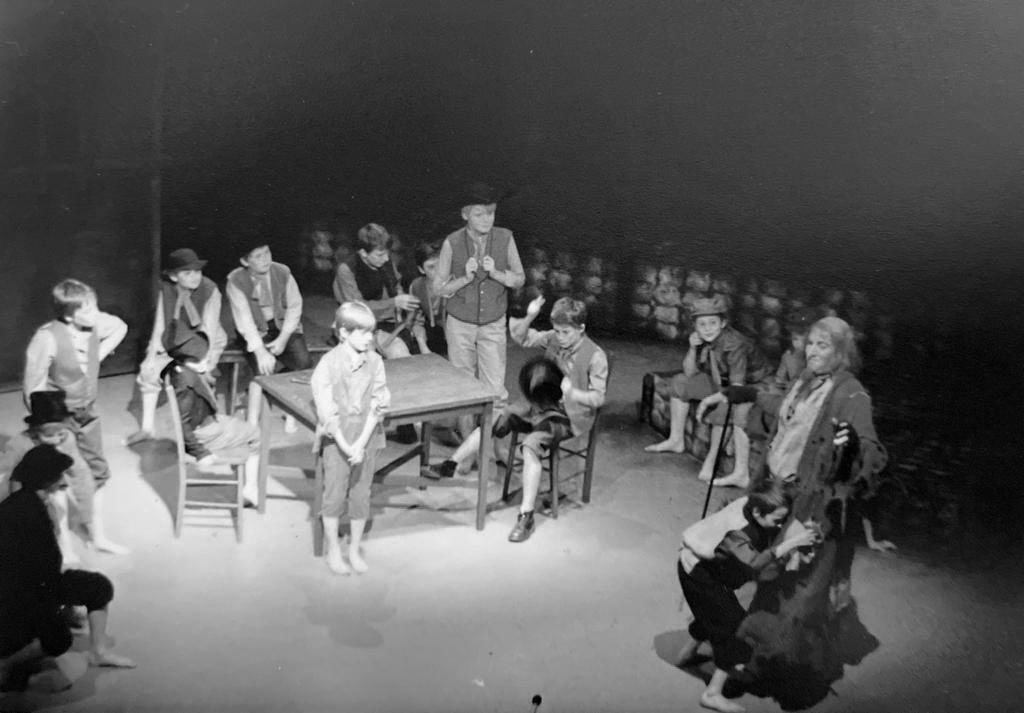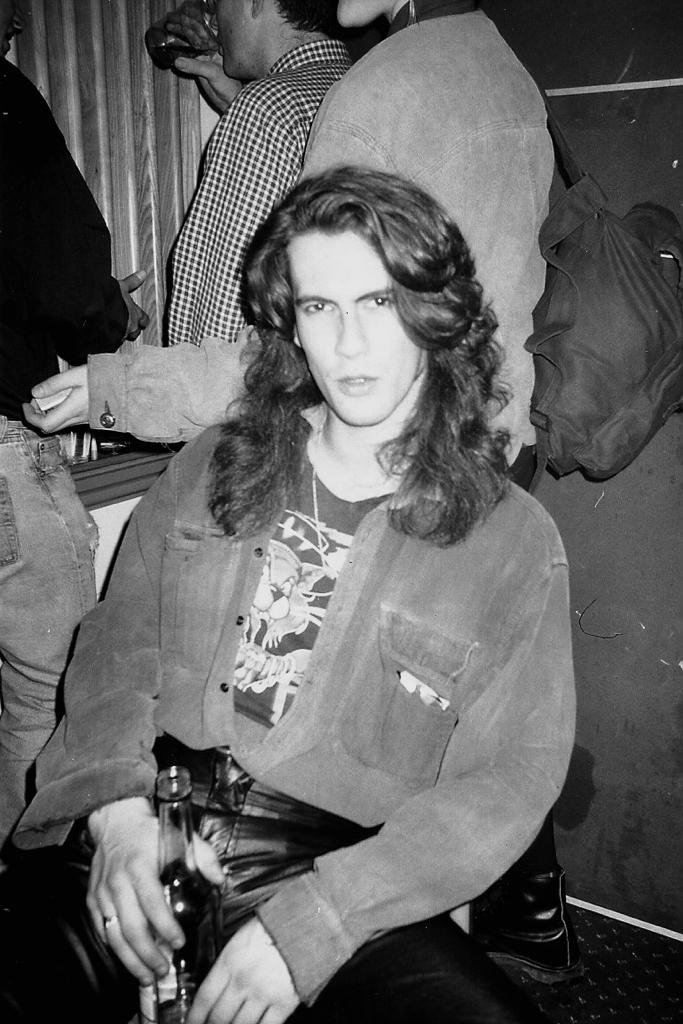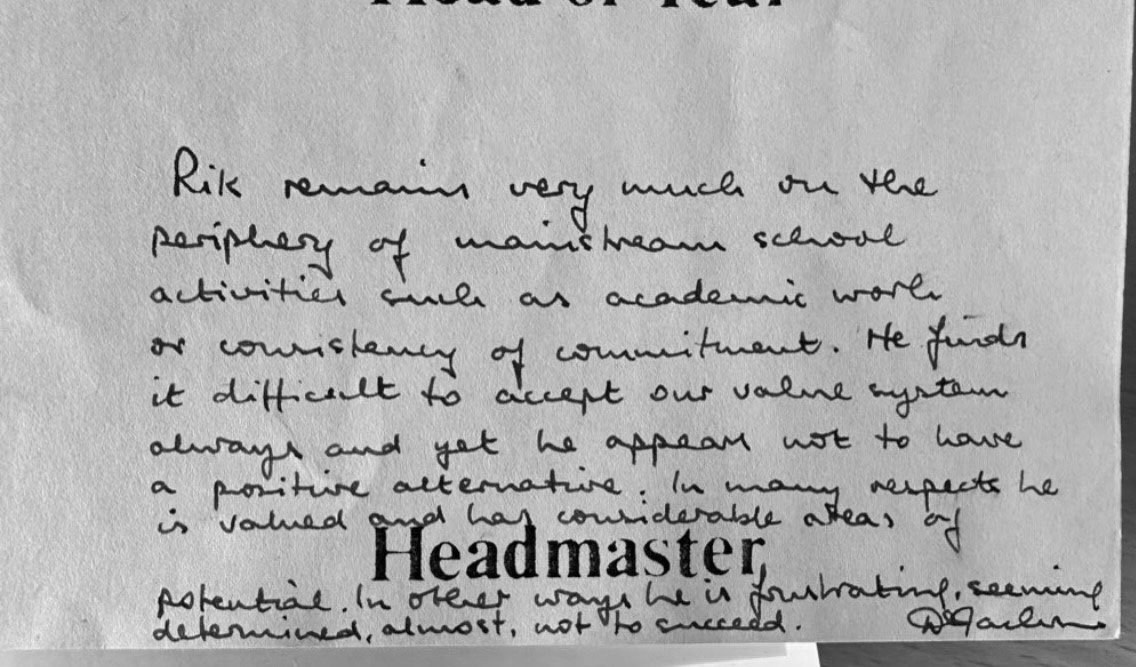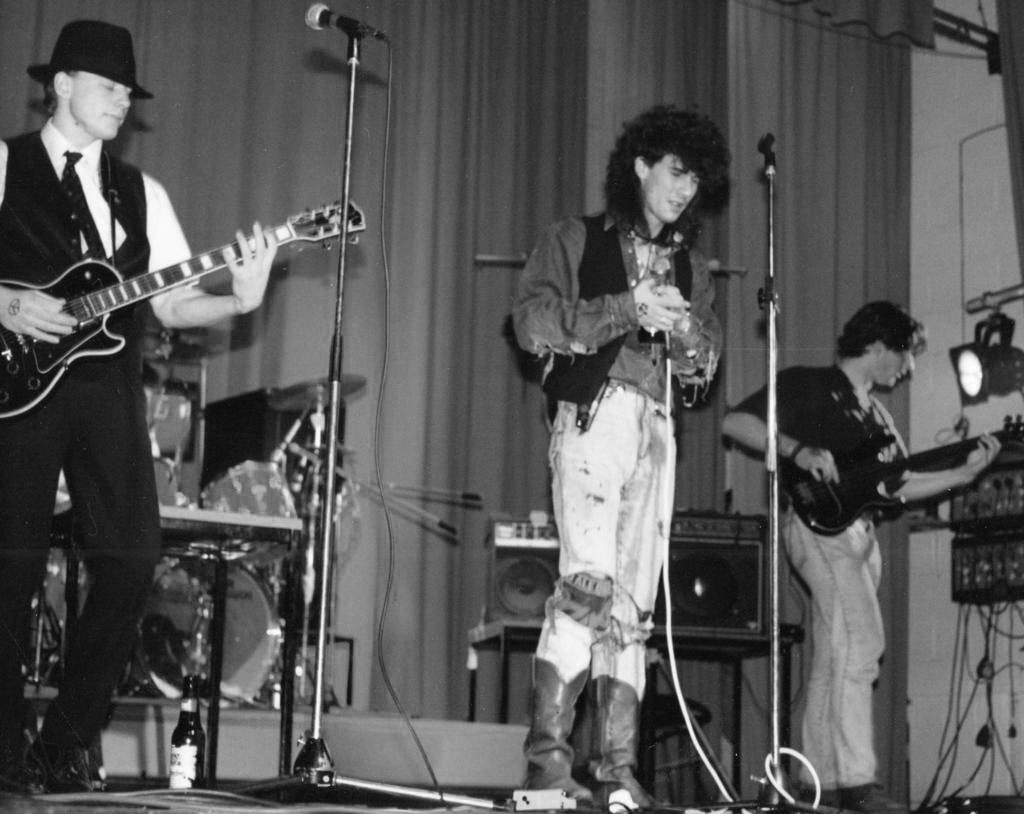
Interviews 27.06.2023
Getting to Know: Rik Ferguson
Disclaimer: This interview took place over fish, chips, and a good old-fashioned pint. Or two. Ladies and gentlemen, I present to you: Rik Ferguson.

Interviews 27.06.2023
Disclaimer: This interview took place over fish, chips, and a good old-fashioned pint. Or two. Ladies and gentlemen, I present to you: Rik Ferguson.
I’d argue that only a handful of names in the UK cybersecurity industry need no introduction, and Rik’s is a name that undoubtedly belongs on that imaginary list. These are the things that make him distinguishable: his willingness to be open and candid as an industry contributor; his love of music; his captivating public speaking; his transparency when it comes to his political opinions; and…his barnet. Rik is often referred to as an “infosec rock star” (a concept that he and I laugh about). I suspect his long locks and penchant for rock music are as responsible for this title as his notoriety in cybersecurity.
Scepticism of industry rock stars aside, Rik could most certainly wear the guitar if they did exist. If the shoe fits and all that. We’ve set this interview to a soundtrack (flagged by song titles as subheads), so feel free to listen along as you get to know Monsieur Ferguson.
The thing that I’ve always found utterly captivating about Rik is his use of the English language, which is even more impressive considering he speaks four languages. When Rik and I sat down in San Francisco back in 2009 to do a similar biography-style interview, I recall walking away in awe of how articulate he is. Fourteen years down the line and I find myself impressed all over again.
“I’ve still got a copy of that 2009 interview you did, that and the front cover [of Infosecurity Magazine] you put me on during COVID,” Rik smiles. We reminisce, and I remind Rik: “Yeah, that was the interview when you told me you’d work at Trend Micro forever,” I jest. “Oh, come on, I did fifteen years; that’s pretty much forever,” he retorts. We clink glasses.
I’m pleased that we’re straight in at the deep end. So what changed? What happened to make a man so utterly convinced he’d be ‘Trend Micro ‘till he died’ jump ship?
“The challenge wasn’t there,” Rik states. “People wanted me just to carry on because I was too valuable doing what I was doing that I wasn’t allowed to advance. Like any relationship, after 15 years, there’s complacency.” He’s keen to state mutual respect and only good memories of a tenure that took a huge slice of his career pie. “My exit wasn’t financially motivated at all; it came down to a simple choice: do I want to end my career at Trend, or do I want to do at least one more thing?” More on this later. For now, let me take you back to the 1980s and introduce you to schoolboy Rik, or in his own words, “the boy that actually untried.”
Rik describes himself first by socio-economical status. “I wasn’t an incredibly disadvantaged kid, but I’m not a little rich boy either.” He then relies on his old headmaster’s written report to paint a more colourful picture: “Rik remains very much on the periphery of mainstream school activities such as academic work or consistency of commitment. He finds it difficult to accept our value system and yet he appears to have no positive alternative.” He pauses while we roar with laughter. Rik is reading this from a photo of the report (see below) and positively delights in its critique. “In many ways he has considerable areas of potential. In other ways, he is frustrating, seemingly determined not to succeed.” He looks up at me and grins. “I don’t dispute it, and I actually appreciate the poetry of it,” he says earnestly.

“Were you determined not to succeed?” I ask. “I was an arsehole,” he shrugs. “I always knew better, talked back and had little respect for rules. I would push it as far as possible to see when it would break. I suppose that’s what got me into tech.”
Rik recalls being called to the headteacher’s office to be chastised for not attending sociology lessons. The uniform was black trousers, “so I was wearing skin-tight, black plastic trousers. He told me they weren’t appropriate and instructed me to ‘go home and change them now,’” recalls Rik. “So I looked him straight in the eye and said: ‘But sir, if I go home now, I’ll miss sociology.’ He didn’t know what to say, so it was a victory to me,” he recalls, pleased as punch.
In many ways, Rik credits this headteacher for the fact that he made it to university. He doesn’t consider himself academic (which shocks me, given his intellect), and he was the first generation of Ferguson to make it. His motivation? The promise of his name on the wooden board next to the head’s office featuring students who had gone on to university. “My mum pointed out that the headteacher would have to walk past that board and see my name every day if I made it. That really helped me,” he grins.
At school, Rik’s passion was for the arts. “I got bitten by the thespian bug at the age of 11,” he remembers, excelling in school productions. “When I went to uni, though, I gravitated to the theatre society, but after meeting the people, I quickly realised ‘this is not for me.’”
Funnily enough, Rik almost, quite literally, ended up at a university that was not for him. “I fucked up my A-levels completely,” he admits, earning a respectable B in French, followed by two E grades and one dreaded U. “My mum convinced me to go through clearing, and off I went to the Costa Brava with my mates.” It was 1988, and Rik was several sangrias deep when he got the call from his Mum to say he’d been offered a place to study French at Lampeter University. Except Rik heard ‘Loughborough’.
“I wasn’t sufficiently interested in checking,” he says, so as I was driving to university and started to cross the Severn Bridge, I asked my parents, “Err, where are we going?!”

Despite that shock, Rik reflects that he “couldn’t have been in a better place. It was tiny, all campus, and I still have many friends I made there.” Rik “scraped through” academically, doing the bare minimum to pass. He had remembered to pack his rebellious streak from school, which amalgamated in an impromptu (and very much unauthorised) rooftop gig on the refectory roof. “We had a whole PA system with drum kit, amplifiers and power cables coming out of students’ bedroom windows to power the whole thing. They’d locked their bedroom doors so no one could get in and unplug us.” On the floor, they had people collecting money for charity. “The University didn’t love it,” he tells me. “I have that letter and fine framed in my downstairs toilet,” he laughs.
There’s no denying it, Rik gets a kick out of rebelling. I put this to him, and it’s met with a little wink. “I don’t like being told what to do, I’m argumentative, and I hate people forcing me to conform to their way of doing something,” he admits. “I’m argumentative, and sometimes I finish other people’s sentences because I get bored of waiting for them to do it,” he says, brutally honest. “Or maybe I’m just an asshole.” There’s another label he sticks on himself. One that I passionately disagree with.
Despite his academic performance being satisfactory at best, you’d be a fool to think this reflects Rik’s intelligence. When he took his first ever security qualification, the CompTIA security plus, he passed with a perfect score of 900 out of 900 and did it within ten minutes. It must have taken significant effort for a man this smart to be an underachiever at school. As he says, “he untried.”
At the age of 53, Rik considers he has around a decade left of his career. And those ten years need more challenge. “Forescout exposes me to more and certainly gives me more challenge,” he says. He describes his new employer as “one of security’s best-kept secrets. I get lots of extra strings to my bow to pluck.” After a short pause, Rik asks me: “Can you pluck on strings? I suppose you yank them. I definitely yank them.”
Forescout may have been the company to court Rik successfully, but it wasn’t the only one that tried. “Several other companies tried, but the time was never right.” Was he ever tempted? “Once,” he answers, and with his hand covering the dictaphone, he whispers which one. His secret is safe with me.
With Forescout, the time was right, and Rik describes his new job (VP of security intelligence, by the way) as a “softer landing”, thanks to the horde of ex-Trend Micro people who had already made the move. “When you know, you know, right? They have fantastic backing from private equity funds, there’s a plan, and they’re executing that plan well.” Does he question whether he made the right move? “Not for a second,” he answers definitively.
That’s not to say the grass is faultlessly green. “There have been some challenges in that Forescout has undergone many changes in a relatively short period of time. They were private, then they IPO’d, and then they were in private equity. They’ve been through three or four CEOs which means much change in a compressed timeframe.” On the flip side, “the culture has been extremely welcoming, I feel valued, and that’s worth more to me than anything.” Rik received a personal email from the CEO with his annual bonus payment. “It was a nice touch to get that email direct from CEO, and the last line of my reply was: ‘I feel valued here’”.

Rik works remotely from his home in Poland, and what a home it is. After moving during the pandemic, Rik and his wife, Kasia, embarked on a project to design and build their own house. It’s stunning. He has been a home worker for almost twenty years since his McAfee days when he temporarily lost his driving license due to an unexplained seizure. It suited Rik, so it stuck. You see, Rik is somewhat of a contradiction. Despite his apparent confidence and lively and outspoken public profile, he’s actually a little shy.
Rik is very happy in Poland and states he “sees no need ever to move back to the UK,” but counters, “The plan is still retirement in France like I told you all those years ago. Remember my dream of selling pottery in the South of France?” How could I forget? “My wife’s in on the plan, and we have a region: Languedoc, for the wine and the weather.”
As for the pots, Rik contends that the room he has reserved in his new home for a recording studio could just as easily moonlight as a pottery studio. He grins. He’s used to his home moonlighting. During the early days of the Russia-Ukraine war, Rik and his family opened their door to invite three Ukranian families to live with them during their darkest days. “We had fifteen minutes’ notice before they arrived,” he recalls. Rik used social media to crowdsource fundraising for one of the families with incredible support from the infosec community.
Speaking of social media, I ask Rik about his and whether his employer – past or present – has ever been concerned that his personal brand eclipses the company’s. I suppose what I’m getting at is: Are they ever threatened by him as an ‘infosec rockstar’?
“No one has ever said a word about it,” he says earnestly. “Ultimately, I’m a platform for the company, so it’s great I have that level of recognition. It’s part of what attracted Forescout to hire me.
“I’m just a 100% package, I don’t compartmentalise very well, so I’d find it very difficult to be a different person professionally than I am personally. I wouldn’t be able to maintain it. Frankly, it would do my head in,” he admits.
“I don’t have any secrets, there’s nothing I’m ashamed of, and I’m very open emotionally.” I can attest to that. Rik and I have what can only be described as a three-hour heart-to-heart, intersected with waves of professional reflections and industry chat. “I recently posted about turning 52. My dad died when he was 52, and I was 26, so I’ve now lived more of my life without him than with him.” I call his public emotional vulnerability brave, but he shakes his head. “It’s not brave because I didn’t have to overcome anything to do it; it’s just me being me.”

It’s not the only time he disagrees with a label I try to put on him. Before ‘brave’, I try ‘humble.’ Laughing, he says: “My wife would disagree with you.” I don’t vocalise the next label during our meeting, but I’m happy to do so now in writing without Rik here to (humbly) disagree. Rik is a phenomenal father. Father of four, his eldest son 19 and his youngest daughter four, Rik contemplates that he’s “too old” for more. “It’s not that four is enough, I’d happily have more, but I want a retirement at some point.”
After his divorce from the mother of his eldest three children, Rik would fly to Germany every other weekend to be with them. “I was trying to make it as normal as possible for them, so I’d hire a house and a car every time I flew in. We’d play cards, watch TV, cook and go for ice cream on a Sunday,” he recalls. His dedication to spending this time with his children despite living in different countries impresses me immensely. “I didn’t divorce them,” he says, “it’s on me to make it work. You give more of yourself when you become a parent. It’s the first time in your life when you truly 100% consider somebody else’s needs before your own.”
And by the sounds of it, it’s a good job he does just that, judging by the label “absolute prima donna” that he puts on his four-year-old daughter, Matilda. “She’s funny as hell, but she takes after her mother in that she knows exactly what she wants,” he grins. She is also very clearly the apple of his eye.
“Do I wish I’d have left Trend Micro sooner?” he repeats, genuinely contemplating my question. He settles on: “No, there’s no point to wishes like that. It’s cheesy, but I don’t regret anything because I can look at every single decision and event, whether positive or negative, knowing that if any of those things changed, I wouldn’t be sitting here at this table with you today. I wouldn’t have the kids I have, either,” he says. “So I don’t regret being married [three times, the first of which he refers to as a “starter marriage”], divorced [twice, his third marriage is going strong a decade in], or any career or personal decision. All these things have a part to play in my remarkably successful and happy career.” He pauses and then adds, “No regrets…I’m starting to sound like Robbie Williams, aren’t I?” he laughs, adding that he doesn’t believe in guilty pleasures as a concept. “That’s so alien to me. If you like something, there’s nothing to feel guilty about.”

The decisions and events Rik refers to have rarely happened by design. “Most have happened by accident, like my Forescout job. That came about because I called an ex-colleague to ask for advice on whether I should take a new role that had been offered to me at Trend. By the end of the call, he said, ‘Why don’t you come and work for us at Forescout?’” So he did.
Forescout ticks the box for Rik’s as-yet-unfulfilled career ambition: to build something from the ground up. “How long I stay depends on what happens there, I guess. It’s privately held right now, but it won’t be forever. As long as they want me to stay, I’ll be happy to stay,” he says, adding that he’s fully bought into the company’s roadmap and execution plan.

Another label I’m tempted to stick on Rik is that of a realist. He calls things what they are, never slipping off that tightrope into negativity or eternal optimism. It occurs to me that the traumatic death of his father has contributed to his outlook, but not in a negative way. “I know now that even when you’re in a bad place, you’ll get to somewhere better eventually. Even if you’re at the bottom of the valley, it’s just part of the journey to the top of the hill.”
“I had to watch my dad die of cancer,” Rik tells me before quickly asking, “Is this too heavy? Are you OK?” I reassure him that I’d like to hear more, that it’s an integral part of his story. “I’d been living in Paris,” he recalls. “He died at home, and it was me who found him. What pissed me off most is that he was no longer breathing, but that fucking morphine pump was still going. It seemed so unjust – does that even make sense?” I nod. “Seeing the undertakers come and put him in a body bag and carry him out of the door…” he pauses, “this was not supposed to be my life at 26 years old. That could have made me give up. As could the collapse of my marriage, my kids moving to another country, it’s all shit stuff,” he says, “but you always end up somewhere better eventually.”
And ending up somewhere better, he did. “My life has been happy, contented and fulfilled,” he contends. There are dozens of labels I could stick on Rik, and fascinatingly, many would be contradictory. Confident yet shy. Intellectual yet academically average (on paper). Argumentative yet kind. Perhaps the label I’m luckiest to stick on him is that of my friend.
In the days leading up to this interview’s publication, Rik and I frequented several gin joints together (well, pubs, but that sounds less poetic), and he confesses: “I’m excited about reading it, but also nervous”. He needn’t have been. This article paints him in a glowing light not because he’s extremely talented, an industry ‘rock star’ or even my friend, but because, frankly, he’s a legend. And that’s a label he thoroughly deserves. *Curtain call.*